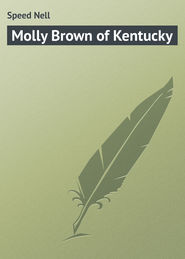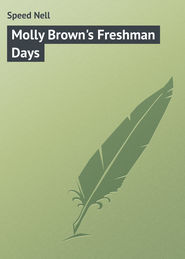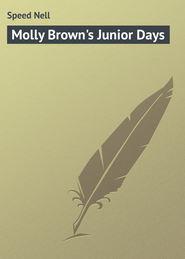По всем вопросам обращайтесь на: info@litportal.ru
(©) 2003-2024.
✖
Molly Brown's Post-Graduate Days
Настройки чтения
Размер шрифта
Высота строк
Поля
“How is that for a gate, Molly? I began my holiday by getting the thing in order. It works beautifully now, but the least bit of rough handling gets it off its trolley.”
“It is fine, Kent. But tell me, are you to have your holiday now?”
“Yes; you see I can help with the harvesting this week, and next week the wedding bells have to be rung. And I thought any spare time I have I could take Miss Judy off your hands.”
“I am afraid that your holiday will be a very busy one,” laughed Judy; “but maybe I can help ring the wedding bells, and, if I can’t do much toward harvesting, I can at least carry water to the thirsty laborers.”
Kent Brown was in an architect’s office in Louisville, working very hard to master his profession, for which he had a fondness amounting to a passion. Mrs. Brown had secretly hoped that one of her boys would want to become a farmer, but they one and all looked upon Chatsworth as a beloved home, but not a place to make a living. Their earnest endeavor, however, was to keep up the place, and often their hard-earned and harder-saved earnings went toward much needed repairs or farm machinery. Mrs. Brown had to confess that a little ready money earned irrespective of the farm was very acceptable; and, since her four boys were on their feet and beginning to walk alone, and stretch out willing, helpful hands to her, she found life much easier.
Not that money or the lack of money had much to do with Mrs. Brown’s happiness. She was a woman of strong character and deep feelings, with a love for her children that her sister, Mrs. Clay, said was like that of a lioness for her cubs. But that remark was called forth when Mrs. Clay, Sister Sarah, one morning found Mrs. Brown making two pairs of new stockings out of four pairs of old ones, after a pattern clipped from the woman’s page of a newspaper. With her accustomed bluntness, she had said: “Well, Mildred Carmichael, if you had only three and a half children, instead of seven, you would not have to be guilty of such absurd makeshifts.”
Mrs. Brown had risen up in her wrath and given her such a talk that, although ten years had elapsed since that memorable morning, Sister Sarah still avoided the subject of stockings with Sister Mildred.
Mrs. Brown was a great reader, and loved old books and old poetry. One of Molly’s earliest remembrances was lying on the otter-skin rug in front of the great open fire, with brothers and sisters curled up by her or seated close to the big brass fender, while mother read Dickens aloud, or the Idyls of the King, or something else equally delightful. One by one the younger children would drop to sleep; and then Mammy would come and do what she called “walk ’em to baid,” muttering to herself, “I hope to Gawd that these chilluns won’t be a dreamin’ all night about that stuff Miss Mildred done packed in they haids.”
Just now, however, Molly’s memories were merged in anticipations, and she watched eagerly for the first signs of welcome.
As they approached the house, the colts neighed, and were greeted by answering whinnies from two mares grazing in a paddock. The mares ran to the white-washed picket fence and stretched their necks as far over as they could, gazing fondly on their handsome offspring, trotting gaily by, tossing their manes and tails.
“The mothers are all coming out to meet their babies, and there is mine!” cried Molly.
It was mother. Oh, that beloved face; that familiar, spirited walk and bearing of the head; those wide, clear, far-seeing gray eyes, and that fine patrician nose, with the mouth ever ready to laugh in spite of a certain sadness that lurked there! She folded Molly in her arms, but did not forget to keep a hand free to clasp Judy’s, and, before Molly was half through her hug, the older woman drew the young visitor to her, and kissed her fondly. Then, with an arm around each girl, she said: “I am truly glad to know my Molly’s friend, and gratified, indeed, to have her with us.”
“It means a great deal to me, too, Mrs. Brown, to see Molly’s mother and home.” Judy feared that it would be forward to say what she had in her mind, and that was “such a beautiful mother and home.”
The house was of white-washed brick, with a sloping gray shingled roof and green shutters, and a general air of roominess and comfort. A long, deep gallery or porch ran across the front, which Architect Kent explained to Judy was not quite in keeping with the style of architecture, but had been added by a comfort-loving Brown to the delectation of all who came after him. The lines of the old house were so good that the addition of a mere porch could not ruin it, and certainly added to its charm and comfort. To the left, in the rear, well off from the house, were the barn-yard and stables, chicken houses, smokehouse, and servants’ quarters; to the right, a tan-bark walk led to the garden. Down that path came Mildred, by her side a young man who seemed to be so amused by her lively chatter that he could hardly contain himself.
“Molly, Molly, I’m so glad to see you, and so is Crit, although he has no words to tell you how glad he is. And, Miss Kean, Judy! It is splendid for you to come just now. I am certain that Kent could not keep the news, and you know by this time that Crit and I are to be married the last of next week. Mr. Rutledge, let me introduce you to Miss Kean.”
Although Crittenden had never uttered a word, he seemed to be able to let Molly understand that he, too, was glad to see her, as he was vigorously hugging her and two-stepping with her over the short, well-kept grass. But, at Mildred’s call, he suddenly stopped, made a low and courtly bow to his partner, and turned to Judy, clasping her hand in a warm and friendly grasp, and giving her such a smile as she had never before beheld. In it he made her feel that she was welcome to Kentucky; that he intended to like her and have her like him; and had his heart not been already engaged, he would lay it at her feet. Never a word did he utter. He was tall, rather soldierly in bearing, with the most beaming countenance Judy had ever seen, and such perfect teeth she almost had her doubts about them.
“Where is Sue, mother?” said Molly. “And Aunt Mary and Ca’line? Of course the other boys are not home so early.”
“Sue has gone over to Aunt Sarah Clay’s. She sent for her in a great hurry. Sue was loath to go, fearing she could not get back before you arrived, but you know your Aunt Clay and how autocratic she is. Sue seems to be in great favor just now. Here is Aunt Mary, however.”
Molly ran to meet the decrepit old darkey, embracing her with almost as much fervor as she had her mother. Aunt Mary Morton was surely of the old school: very short and fat, dressed in a starched purple calico, with a white “neckercher” and a voluminous gingham apron, her head tied up in a gorgeous bandanna handkerchief.
“Oh, my chile, I’m glad to see you. I hope you done learned ‘nuf to stay at home a while. Yo’ ma’s so lonesome ‘thout you, with Mr. Ernest ‘way out West surveyin’ the landscape.” (Ernest, the oldest of the Brown boys, was employed by the government on the geological survey.) “Mr. Paul so took up wif sassiety in Lou’ville he can’t hardly walk straight, and jes’ come home long ‘nuf to snatch a moufful – but I done tuck ’ticular notice he do manage to eat at home in spite er all his gran’ frien’s. And now, Miss Milly gwine to step off; an’ ‘mos’ fo’ we git time to cook up any mo’ victuals, Miss Sue’ll be walkin’ off. Praise be, she ain’t a-goin’ fur. How she eber made up her min’ to gib her promise to a man what lib up sech a muddy lane, beats me; an’ Miss Sue, the mos’ ‘ticular of all yo’ ma’s chilluns ‘bout her shoes an’ skirts an’ comp’ny! Now Mr. John ain’t been a full-fleshed doctor mo’n two weeks befo’ he so took up wif a young lady’s tongue what stayin’ over to Miss Sarah Clay’s, and so anxious ‘bout feelin’ her pulse, dat yo’ ma an’ I don’ neber see nothin’ of him. He jes’ come home from dat doctor’s office in town long ‘nuf to shave and mess up a lot er crivats an’ peck a little eatin’s, an’ off he goes. My ‘pinion is, dat’s what Miss Sarah done sent for Miss Sue in sech a hurry ‘bout, but you’ ma say fer me to hesh up, no sich a thing, she jes’ wan’ to talk ‘bout a suit’ble weddin’ presen’ for little Miss Milly.”
“Oh, Aunt Mary, isn’t it exciting to have a wedding in the family? You always said Milly would be the first to get married, if Sue was the first to get born,” said Molly, giving the old woman another hug for luck. “Now I want you to shake hands with my dear friend, Miss Judy Kean.”
Aunt Mary made a bobbing curtsey to Judy, then gave her a friendly handshake, looking keenly in her face the while. Then she nodded her head, until the ends of the bright bandanna, tied in a bow on top of her head, quivered, and said: “I don’ know but what that there Kent was right.”
“Aunt Mary, I am truly glad to meet you. If you could hear the blessings that are showered on your head when Molly gets a box from home, and could see how hard it is for all of those hungry girls to be polite when the time comes for snakey noodles, you would know how honored I feel that I am the first to make your acquaintance.”
“Well, honey, what makes all of you go ‘way from yo’ homes to sech outlandish places as collidges where the eatin’s is so scurse? Can’t you learn what little you don’ know right by yo’ own fi’side?”
“Maybe we could, Aunt Mary, but you see I haven’t any real fireside of my own.”
“What! did yo’ folks git burned out?”
“Oh, no; but you see my father is an engineer, and mamma travels with him, and stays wherever he stays; and, when I am not at school or college, I knock around with them. Of course, I’d like to have a home like Chatsworth, but it is lots of fun to go to new places all the time and meet all kinds of people.”
“Well, they ain’t but two kin’s, quality an’ po’ white trash, an’ I’ll be boun’ you don’t neber take up wid any ob dat kin’, so you an’ yo’ ma ‘n’ pa mought jes’ as well stay in one place.”
While the girls were up in Molly’s room, which Judy was to share, getting ready for a belated dinner, they heard the sound of a piano, cracked but sweet, like the notes of an old spinnet, then a male voice, wonderful in its power and intensity, and at the same time so sweet and full of feeling that Judy, ever emotional where art was concerned, felt her eyes filling.
“Shed no tear, oh, shed no tear!
The flower will bloom another year.
Weep no more! Oh, weep no more!
Young buds sleep in the root’s white core.
Dry your eyes, oh, dry your eyes!
For I was taught in Paradise
To ease my breast of melodies,
Shed no tear.
“Overhead – look overhead
’Mong the blossoms white and red.
Look up, look up! I flutter now
On this flush pomegranate bough.
See me! ’tis this silvery bill
Ever cures the good man’s ill.
Shed no tear, oh, shed no tear!
The flower will bloom another year.
Adieu, adieu – I fly. Adieu,
I vanish in the heaven’s blue,
Adieu, adieu!”
“Oh, Molly, Molly, who is that?” cried Judy, weeping copiously, in spite of the repeated request of the singer to “shed no tear.”
“Why, that is Crit. Isn’t his voice wonderful?”
“Do you really mean it is Mr. Rutledge? I thought he was dumb, and have been feeling so sorry for Mildred.”
“Dumb, indeed! He has the most beautiful voice in Kentucky, and can make such an eloquent speech when roused that we have been afraid he would go into politics. But, so far as passing the time of day is concerned, and the little chit-chat that fills up life, he is indeed as dumb as a fish. When he was a little boy he stammered and got into the habit of expressing his feelings in silence, and he can still do it. He had a teacher who cured him of stammering, but nothing will ever cure him of silence, unless he has something important to say, and then nothing can stop him. Mother tells of a man who stammered in talking but not in singing. One day he was passing a friend’s house, and saw that the roof was in a blaze, the inmates perfectly unconscious of the conflagration. He rushed in, tried to speak, could only stutter, and then in desperation burst into song. To the tune of ‘The Campbells Are Coming,’ he sang, ‘Your house is on fire, tra-la, tra-la!’ Kent declares that Crit proposed to Milly in song, but Milly herself is dumb about how that came about.”
“Well, anyhow, I have never heard such scintillating silence as his, and I think that Milly ought to be a very proud and happy girl.”
CHAPTER III. – WEDDING PREPARATIONS AND CONFIDENCES
The next two weeks were busy ones for all the Brown household: first and foremost, the ever-crying need of clothes to be answered; second, the old house to be put in apple-pie order; all the furniture rubbed and rubbed some more; the beautiful old floors waxed and polished until they shone and reflected the newly scrubbed white paint in a way Judy thought most romantic. (But Judy thought everything was romantic those days.) She was “itching to help,” and help she did in many ways. Molly would not let her rub furniture or wax floors, but she had the pleasure of hanging the freshly laundered curtains all over the house, and she was received with joy in the sewing room by Miss Lizzie Monday, the neighborhood seamstress. Miss Lizzie was of the opinion that the Browns thought entirely too much about food and not nearly enough about clothes. Indeed it was a failing of the mother, if failing she had, to have good food, no matter at what cost, and then, since strict economy had to be practiced somewhere, to practice it on the clothes.
Miss Lizzie had once been present when they were packing a box to send to Molly at Wellington, and had sadly remarked: “In these hard times, with the price of food what it is, poor little raggedy Molly could have had an entire new outfit from the contents of that box.” Mrs. Brown had indignantly denied that she was spending any money at all on the box, but the fact remained in Miss Lizzie’s mind that the food in the delightful box, so eagerly looked for by the hungry college girls, represented so much money that had much better be put on Molly’s outside than her inside.
“Not that much of it goes on her own inside. I know Molly too well, bless her heart. Can’t I just see her handing out that good old ham and hickory-nut cake and Rosemary pickle to those Yankees? And they, raised on pale, pink, ready-cooked ham and doughnuts and corner grocery dill pickles, don’t know what they are getting. Molly, in her same old blue that I have made over twice for her! – and that ham would have bought the stuff for a new one (not that I would have had it anything but blue). The half gallon of Rosemary pickle would have trimmed it nicely, and the hickory-nut cake would have made her at least two new shirtwaists, and the express on the box would more than pay me for making the things.”
Judy loved to hear Miss Lizzie talk, and used to encourage her to praise her friend, while she sat helping to whip lace or planning the bridesmaids’ dresses for Molly and Sue. These dresses were flowered French organdies. Molly’s was covered with a feathery blue flower, that never was on land or sea, but it was the right color, which was the important thing; and Sue’s bore the same design in pink. The bride’s dress, a lovely simple gown of the finest Paris muslin, was all done and pressed and neatly folded in a box by the careful Miss Lizzie, with one of her own sandy hairs secretly sewed in the hem, which is supposed to bring good luck, and a “soon husband” to the owner of the hair.











